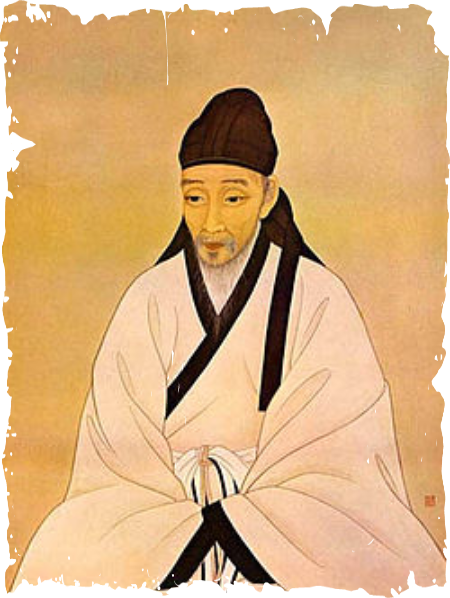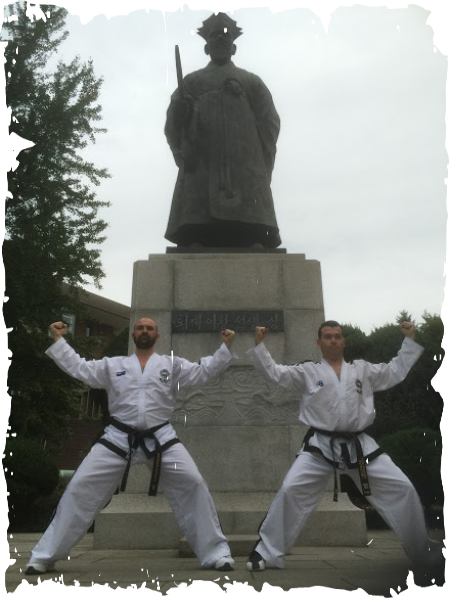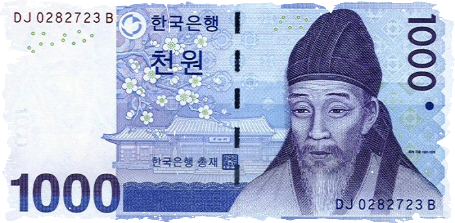Pattern History - Toi-Gye Tul
Yi Hwang (1501–1570) is one of the two most prominent Korean Confucian scholars of the Joseon Dynasty, the other being his younger contemporary Yi I (Yulgok). A key figure of the Neo-Confucian literati, he established the Yeongnam School and set up the Dosan Seowon, a private Confucian academy. Yi Hwang is often referred to by his pen name Toi-Gye ("Retreating Creek"). His courtesy name was Gyeongho.
Life
Yi Hwang was born in Ongye-ri, Andong, North Gyeongsang Province, in 1501. He belonged to the Jinseong Yi clan, and was the youngest son among eight children. A child prodigy, he learned the Analects of Confucius from his uncle at age twelve and admiring the poetry of Tao Qian, started writing poetry. His poem Yadang (hangul:야당, hanja:野塘, "Pond in the Wild"), written at the age of eighteen, is considered one of his major works. Around the age of twenty, he immersed himself in the study of I Ching and Neo-Confucianism.
He came to Seoul when he was 23 years old and entered the national academy Sungkyunkwan in 1523. In 1527 he passed preliminary exams to become a government official, but re-entered Sungkyunkwan at the age of 33 and socialized with the scholar Kim In-hu. He passed the civil service exams with top honors in 1534 and continued his scholarly pursuits whilst working for the government. He returned to his childhood home at the death of his mother at the age of 37 and mourned her for 3 years. He was appointed various positions from the age of 39 and sometimes held multiple positions including secret royal inspector, or Amhaengeosa (hangul:암행어사, hanja:暗行御史), in 1542. His integrity made him relentless as he took part in purges of corrupt government officials. On numerous occasions he was even exiled from the capital for his firm commitment to principle.
Yi Hwang was disillusioned by the power struggles and discord in the royal court during the later years of King Jungjong's reign and left political office. However, he was continuously brought out of retirement and held several positions away from the royal court and in rural areas. He was the governor of Danyang at 48 and governor of Punggi afterwards. During his days at Pungi he redeveloped and improved the private Neo-Confucian academy Baekundong Seowon established by his predecessor Ju Se-bung.
He was named Daesaseong (대사성, head instructor) of Sungkyunkwan in 1552 but turned down other prominent offices later on. In 1560, he established the Dosan seodang and engrossed himself in meditation, study, and teaching his disciples. King Myeongjong tried to coax him back to political office, but he was steadfast in his devotion to study. He finally returned to the royal court at 67 upon the king's request when envoys from the Ming Dynasty came to Seoul. When King Myeongjong suddenly died, his successor King Seonjo appointed Yi Hwang as Yejo panseo(hangul:예조판서, hanja:禮曹判書, minister of rites) but he declined and returned to his home once again.
However, the king continuously called Yi Hwang back and unable to refuse further, he resumed office at the age of 68 and wrote many advisory documents including Seonghak sipdo (hangul:성학십도, hanja:聖學十圖, "Ten Diagrams on Sage Learning"). He also gave lectures from the teachings of Song Dynasty Confucian scholars Cheng Yi and Cheng Hao, I Ching, Analects, and Zhang Zai in royal presence. He finally retired from politics at the age of 70 and died in 1570. During forty years of public life he served four kings (Jungjong, Injong, Myeongjong and Seonjo). On his death, Yi Hwang was posthumously promoted to the highest ministerial rank, and his mortuary tablet housed in a Confucian shrine as well as in the shrine of King Seonjo. His disciples and followers reorganized the Dosan seodang to Dosan Seowon in 1574.
In modern culture
Toegye-Ro, a street in central Seoul, is named after him, and he is depicted on the South Korean 1,000 won note.
The Taekwondo pattern Toi-Gye was named in honor of Yi Hwang.
Many institutes and university research departments devoted to Yi Hwang have been established. The Toegye Studies Institute set up in Seoul in 1970, Kyungpook National University's Toegye Institute opened in 1979, and an institute and library in Dankook University in 1986. There are research institutes in Tokyo, Taiwan, Hamburg and the United States.
Life
Yi Hwang was born in Ongye-ri, Andong, North Gyeongsang Province, in 1501. He belonged to the Jinseong Yi clan, and was the youngest son among eight children. A child prodigy, he learned the Analects of Confucius from his uncle at age twelve and admiring the poetry of Tao Qian, started writing poetry. His poem Yadang (hangul:야당, hanja:野塘, "Pond in the Wild"), written at the age of eighteen, is considered one of his major works. Around the age of twenty, he immersed himself in the study of I Ching and Neo-Confucianism.
He came to Seoul when he was 23 years old and entered the national academy Sungkyunkwan in 1523. In 1527 he passed preliminary exams to become a government official, but re-entered Sungkyunkwan at the age of 33 and socialized with the scholar Kim In-hu. He passed the civil service exams with top honors in 1534 and continued his scholarly pursuits whilst working for the government. He returned to his childhood home at the death of his mother at the age of 37 and mourned her for 3 years. He was appointed various positions from the age of 39 and sometimes held multiple positions including secret royal inspector, or Amhaengeosa (hangul:암행어사, hanja:暗行御史), in 1542. His integrity made him relentless as he took part in purges of corrupt government officials. On numerous occasions he was even exiled from the capital for his firm commitment to principle.
Yi Hwang was disillusioned by the power struggles and discord in the royal court during the later years of King Jungjong's reign and left political office. However, he was continuously brought out of retirement and held several positions away from the royal court and in rural areas. He was the governor of Danyang at 48 and governor of Punggi afterwards. During his days at Pungi he redeveloped and improved the private Neo-Confucian academy Baekundong Seowon established by his predecessor Ju Se-bung.
He was named Daesaseong (대사성, head instructor) of Sungkyunkwan in 1552 but turned down other prominent offices later on. In 1560, he established the Dosan seodang and engrossed himself in meditation, study, and teaching his disciples. King Myeongjong tried to coax him back to political office, but he was steadfast in his devotion to study. He finally returned to the royal court at 67 upon the king's request when envoys from the Ming Dynasty came to Seoul. When King Myeongjong suddenly died, his successor King Seonjo appointed Yi Hwang as Yejo panseo(hangul:예조판서, hanja:禮曹判書, minister of rites) but he declined and returned to his home once again.
However, the king continuously called Yi Hwang back and unable to refuse further, he resumed office at the age of 68 and wrote many advisory documents including Seonghak sipdo (hangul:성학십도, hanja:聖學十圖, "Ten Diagrams on Sage Learning"). He also gave lectures from the teachings of Song Dynasty Confucian scholars Cheng Yi and Cheng Hao, I Ching, Analects, and Zhang Zai in royal presence. He finally retired from politics at the age of 70 and died in 1570. During forty years of public life he served four kings (Jungjong, Injong, Myeongjong and Seonjo). On his death, Yi Hwang was posthumously promoted to the highest ministerial rank, and his mortuary tablet housed in a Confucian shrine as well as in the shrine of King Seonjo. His disciples and followers reorganized the Dosan seodang to Dosan Seowon in 1574.
In modern culture
Toegye-Ro, a street in central Seoul, is named after him, and he is depicted on the South Korean 1,000 won note.
The Taekwondo pattern Toi-Gye was named in honor of Yi Hwang.
Many institutes and university research departments devoted to Yi Hwang have been established. The Toegye Studies Institute set up in Seoul in 1970, Kyungpook National University's Toegye Institute opened in 1979, and an institute and library in Dankook University in 1986. There are research institutes in Tokyo, Taiwan, Hamburg and the United States.


Above: Mr. Doogan and Mr. Raukura, in Namsan District, Seoul, South Korea. Statue of Yi Hwang (Toegye).

Above: Yi Hwang on the 1000 Won Korean Banknote.


